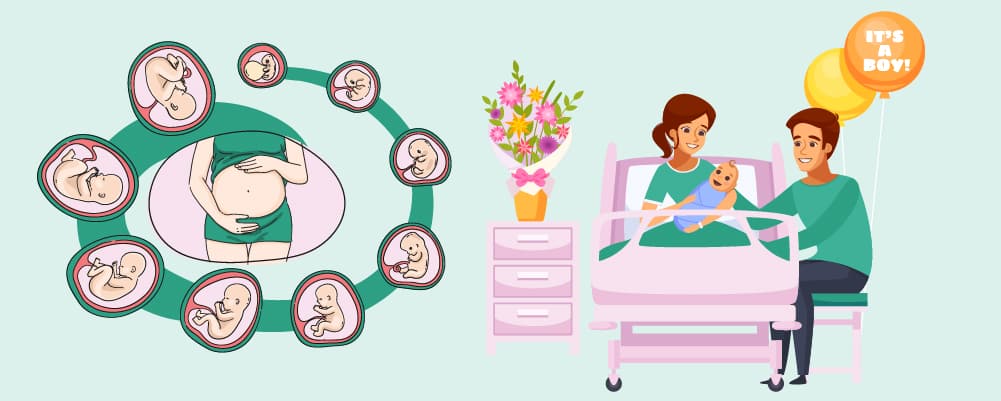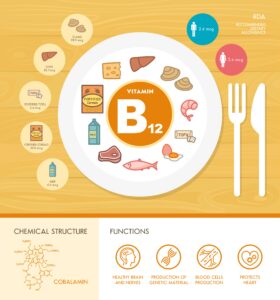

Becoming a first-time mom can evoke feelings of happiness and anticipation, but also worry. Maternal body changes, or simply concerns about having a healthy pregnancy can create a bit of anxiety. Add to it the pressures of coming up with the perfect baby name and purchasing baby gear, and you have a recipe for stress.
Here, we will discuss what mothers-to-be should expect throughout each stage of pregnancy, and, hopefully, reduce some of the fears.

Pregnancy is divided into three stages, called trimesters. These timeframes reflect specific periods of fetal development:
First Trimester 1 to 12 weeks
Second Trimester 13 to 28 weeks
Third Trimester 29 to 40+ weeks
In order to determine how far along a woman is into her pregnancy, doctors calculate a “due date.” In medical terms, this date is called the estimated day of confinement (EDC). It is based on the first day of the last normal menstrual period. A pregnancy test is positive by the first day of a missed period which equates to four weeks pregnant. The EDC is later confirmed or adjusted based on prenatal testing throughout the pregnancy. Although the birth may not occur until 40 weeks gestation, 37 weeks is considered full-term.

One of the first indicators of pregnancy is a missed menstrual period. During these initial weeks, however, some women experience spotting or even normal menstrual bleeding. It is common to feel more tired or have breast tenderness. These symptoms may progress to an increased appetite or nausea with vomiting. Abdominal cramping, pelvic pressure, urinary frequency, and headaches may also develop.
Every organ system is affected by the hormonal changes of pregnancy. The heart and blood vessels increase blood flow to the uterus and other organs. Lungs become more efficient in bringing oxygen into the bloodstream. The pancreas also produces less insulin. Changes to the immune system occur which may affect how a mom-to-be fights infections or develops allergic reactions. Most importantly, pregnancy hormones are important in the formation of the placenta and preparing the uterus to support the pregnancy. In contrast, motility of the stomach and intestines may become sluggish, and heartburn or constipation develop. There are a few ways, however, to prevent these changes from becoming bothersome.
1. Remember to Hydrate
During the first trimester, the body’s blood volume increases by 50 percent. It is, therefore, important to drink enough water to support this change. Good hydration reduces symptoms such as nausea and constipation, but creates a frequent need to urinate. Hydration is so important that it is the first thing addressed at prenatal office visits, or when preterm labor occurs.
2. Eat More Fiber
In addition to drinking lots of fluids, dietary fiber helps to combat slower gut motility during pregnancy. Fiber can reduce bloating, constipation, and gassiness. When stools are easier to pass, there is less straining which reduces the likelihood of hemorrhoids.
3. Eat Small Snacks and Bland Foods
Morning sickness and nausea are common first trimester symptoms. Large meals take longer to pass through the gastrointestinal tract, so vomiting is more likely. Small but frequent snacks are easier to digest, and still provide necessary calories. Ginger has been shown to reduce nausea, and increase the passage of food out of the stomach. Teas with this ingredient can be helpful. Sometimes, however, just sipping small amounts of clear broth every few hours is all that can be tolerated. If you feel worse after taking prenatal vitamins, try crushing and blending them in a smoothie.
4. Try a Motion Sickness Band
These are wrist bands designed to help reduce motion sickness while riding on boats or cruise ships, but many women feel they improve the nausea associated with pregnancy. Based on an acupressure technique, the bands compress a nerve in the wrist that sends a “pressure signal” to the brain instead of one of nausea.
5. Exercise
It is essential to maintain healthy habits during pregnancy such as regular exercise. However, it is important to drink fluids prior to and during exercise to prevent dehydration or becoming overheated. It is also best to avoid contact sports which could result in trauma to the belly.
6. Healthy Foods Are Good for Mom and Baby
Eating foods that are high in vitamins, minerals, protein, and other nutrients help to support a healthy pregnancy. These include fruits, vegetables, lean meats or plant-based proteins, and whole grains. Grilled and baked foods are healthier than those fried in oil. Processed and fast foods are often high in saturated fat and sodium, but low in nutrients. Too much salt can lead to high blood pressure during pregnancy. In addition, deli meats and unpasteurized cheeses may harbor a bacteria called listeria which can cause harm to an unborn baby.
Caffeinated beverages increase urination and, therefore, the risk of dehydration. Drinks with low levels of caffeine (200 to 300mg per day) are acceptable. Alcohol can cause birth defects, so it should be avoided during pregnancy.
7. Avoid Eating “For Two”
During this early stage of pregnancy, only an extra 300 calories per day are necessary. This equates to eating 1 cup of cereal with 8 oz of milk and a banana, not very much food at all. More calories are needed during the second and third trimesters. Unfortunately, 50 Percent of women gain more than the recommended amount of weight during their pregnancies. This increases the risk of gestational diabetes and other problems. It is also important to remember to eat protein with any carbohydrates to minimize blood sugar fluctuations that can cause jitteriness and nausea.
8. Cook Food Thoroughly
Consuming eggs, poultry, meats, or seafood that is undercooked increases the risk of acquiring a bacterial or parasitic infection. It is best to avoid eating foods such as sushi, salad dressings or sauces made with raw eggs, and rare meats. To be safe, most of these proteins should be cooked to an internal temperature of 165 degrees F.
9. Increase Your Folate Intake
One of the most crucial vitamins to take before and throughout pregnancy is folic acid or folate. Folic acid is the synthetic vitamin form, and folate is found in foods such as beans, legumes, citrus fruits, meats, fish, and whole grains. This B vitamin reduces the risk of brain and spinal cord defects. 400 mg is the minimum recommended amount for women planning to become pregnant. Those who follow a vegan diet may need more.

The second trimester is often the “best time of pregnancy” because there is less physical discomfort. Nausea improves, and acne, if present, typically resolves toward the end of this trimester. Breast tenderness and swelling become more tolerable, although some nipple sensitivity may remain.
1. Practice Kegel Exercises
Kegel exercises are specific muscle contractions done to maintain the strength of the pelvic floor muscles. These muscles surround the rectum and lower portion of the bladder to prevent stool or urine leaks. They also support the uterus, so good muscle tone is important during pregnancy. As the uterus enlarges and compresses the bladder, urinary leaks can be minimized by doing Kegel exercises a few times daily.
2. Ligament Pain Is Normal
By 20 weeks gestation, the baby’s movement can be detected. This and other sudden movements may trigger round ligament pain as the size of the uterus expands. Round ligaments are supportive structures that lie along the sides of the uterus and attach to the pubic bone. Unlike muscle tendons, ligaments are less elastic. Discomfort may be felt when they are stretched while twisting or jumping. Despite any discomfort that you may feel, the baby is not harmed. Over-the-counter acetaminophen may be taken to relieve this pain. Ibuprofen and similar medications should be avoided because they increase the risk of fetal kidney problems.
3. Continue Taking Prenatal Vitamins
It may not always be possible to eat enough nutrient-dense foods during pregnancy. Prenatal vitamins ensure that the right nutrients are present for optimal maternal and fetal health. In particular, vitamins A and D, folic acid, iron, and zinc are essential.
4. Continue to Exercise, But Less Vigorously
Exercise during pregnancy is good for a woman’s heart health, and for optimal blood flow to the placenta. It may also reduce constipation. Strenuous exercises and those that require balance, however, strain joints, and increase the risk of injuries. Exercise endurance may also be lower due to the body’s physiological changes.
5. Plan for Delivery and the Postpartum Period
Before the new baby arrives, it’s a good idea to get prepared. Many prenatal classes are available in-person and online. Research what your newborn will need, and about breastfeeding. This is also a time to decorate and prepare the nursery, stocking it with diapers, burp cloths, onesies, and other necessities.
It has also become popular for women to write a Birthing Plan. This informs the healthcare team of your wishes regarding the birth process. However, it may not be possible to accommodate all requests, especially for high-risk pregnancies.

1. Pregnancy Support Pillows
Finding a comfortable sleeping position becomes more difficult during the last trimester of pregnancy. There are a variety of pillows on the market that can help make lying in bed more comfortable. Whole-body pillows give better support for side sleeping.
Acid reflux is common during the third trimester due to upward uterine pressure on the stomach. Smaller pillows can be used to elevate your head, and incline the upper body to reduce reflux symptoms. It may be also helpful to avoid eating two to three hours before bedtime.
2. Tips for Restless Leg Syndrome
Restless leg syndrome is an uncontrollable need to move the legs while sleeping. The legs feel agitated or have a tingling sensation. Onset begins during the third trimester, and up to 34 percent of pregnant women suffer from it. This condition can be associated with painful calf muscle spasms which disrupt sleep. Dietary deficiencies in folate and iron are associated with restless leg syndrome, and symptoms often improve with supplementation. Muscle cramps can be relieved by first extending and straightening the affected leg, then gently flexing the ankle and toes upward. Your doctor may recommend calcium or magnesium supplements to reduce these cramps.
3. Expect Mild Contractions, and Take Note of Stronger Ones
Mild, random uterine contractions are called Braxton-Hicks. These feel like a tightening of the uterine wall, but are painless and no cause for concern. There is a regularity or pattern to these contractions, and they tend to be brief. Taking a walk or resting if they occur from activity usually stops them. They may occur throughout the pregnancy, but more frequently during the last trimester. If the contractions become more intense or painful, this could be a sign of premature labor that warrants medical attention.
4. Try Yoga for Exercise
Yoga is a great way to de-stress, and still get some exercise. In-person or virtual pregnancy yoga classes are available. Exercise can also boost your mood. It is common for women to feel depressed or anxious while pregnant, and even develop problems with memory. It’s a good idea to schedule regular exercise and talk to other women who have experienced pregnancy.
5. Prepare for the Delivery
After 34 weeks, it is time to pack your hospital bag and purchase a car seat. Most hospitals require car seats for infant transport, and may even do an assessment before a baby is discharged home. It can also be helpful to prepare and freeze meals to eat once you return home from the hospital.
6. Let Nature Take Its Course
The internet is filled with myths about how to induce labor, but most have no merit. Nipple stimulation can promote a release of oxytocin, the hormone that causes uterine contractions. However, it is best to get plenty of sleep and allow labor to occur naturally. Once the baby arrives, there will be less time for rest.

Congratulations, and welcome to parenthood!

If you’re pregnant, trying to conceive, breastfeeding, or you’ve recently given birth, you’re likely aware of the essential vitamin folic acid—also called folate, or vitamin … Read more